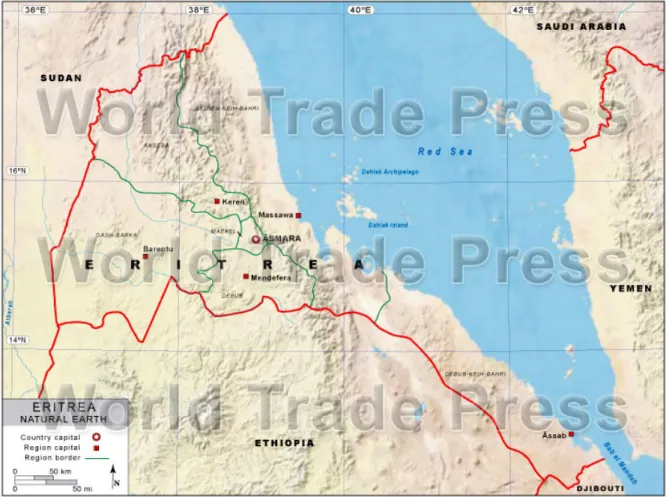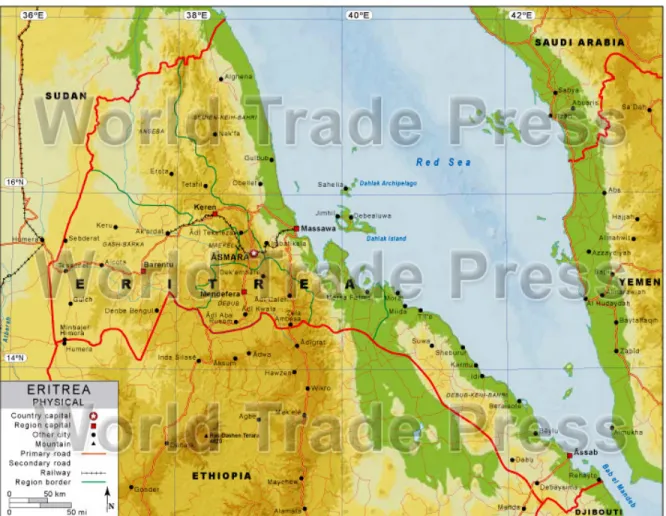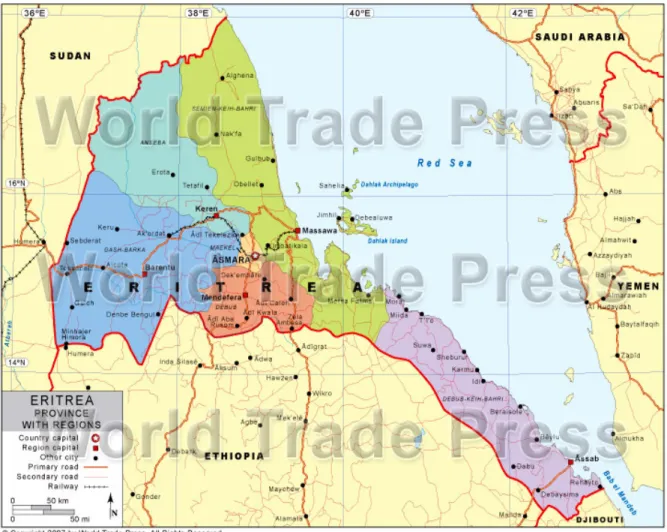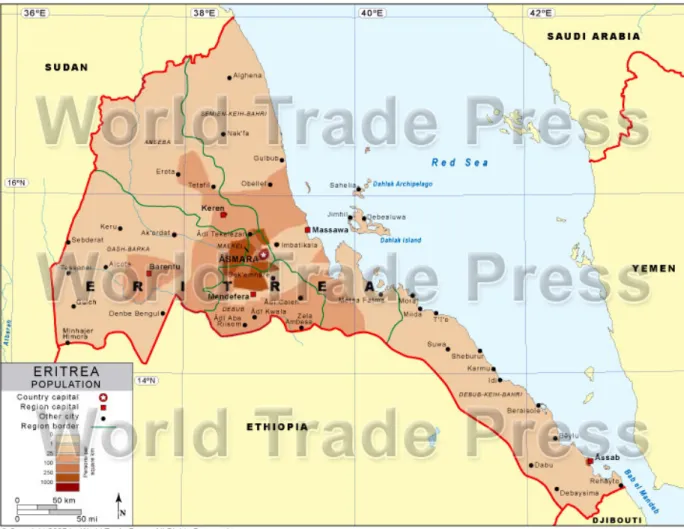Both of these aspects deprived people of the right to livelihood (due to the lack of new jobs in the private sector) and the right to information (to distinguish and discriminate which of the government's activities were right and which were wrong). wrong). The study also examines the results of the alternative model of democratization and partial opening of access to global information technologies by the Eritrean state. Therefore, the paper discusses the above statement of the problem in the wake of the conflict that arises between the general perception of democracy and the democracy that the President of Eritrea has believed in for more than two decades.
In response to the criticism, the president ordered the closure of the press and the arrest of the journalists who ran such reports in the print media. First, the country has been under one-man rule, that of the president, whose authority cannot now be questioned in any way.
Review of Existing Media A. Print Media
However, the regional language editions have exhibited some qualities of market-driven journalism by publishing special bulletins to meet the needs of the youth preparing for the board-level examination as well as TOEFL (Test of English as a Foreign Language) or ELTS (English Language Testing Service). A war psychosis is thus constantly generated among the young and the adults in Eritrea. Most of the youth can be found on the websites through which the government has blocked the flow of information to the state.
President’s New Model of Democratization
Both in the Ministry of Education and elsewhere, such as banks and judicial organizations, many have expressed the opinion that the primary purpose of democracy as conceived by the West is to deliver to the people the fruits of government policies and programs, and the President of Eritrea, by holding elections at the zonal level, aims to achieve precisely this. The elections were non-party based although several candidates contested the seats in the local government. However, Connell (2005) forgot to mention the public endorsement and satisfaction with such electoral practices that the author of this article observed in his survey of the views of citizens and important officials in the Ministry and in the banks.
Although the Macropolitik (1994) promised full elections for the National Assembly, which of course did not happen, it clearly supported the democratic principles of its Article 7, which is repeated in the preamble. He lives a simple life, eats ingera (the usual food of Eritreans) and stays in the camp of government officials, not in the palace of his President. Even during the pre-independence war, Isaias Afwerki had designed a series of training programs for participating women and girls, which worked very well indeed in maintaining interest in the long war against Ethiopia.
The government has also geared up to develop the education for vocational and other vocational programs at all levels, so that trained labor can immediately seek employment on the market (Rapid Transformation of the Eritrean Educational System, 2002). Such a desire evidently resulted in a greater use of the Internet and mobile services, through which students and young people began to express their desire for greater freedom of expression. The desire and demand for greater freedom of expression and a media role in the democratization of Eritrea: An online survey of Eritrea's youth.
Responses obtained through mail, chat and messages were compared with responses from some media and government officials in one-on-one interviews.
Analysis of the Results
E-mail identities were first acquired by young people and adults through chat rooms or boiler services. Most young people would like the government to immediately stop forcing them to do mandatory national service. Due to the constant war psychosis fanned by the government print and electronic media, the youth of the country have come to feel that they do not have long to live because of the impending war.
Most young people feel they have no outlet to express their views on the issues that affect their lives. Most youth and adults believed that their country has abundant resources. Due to tight restrictions and the military nature of the regime with the restriction on freedom of expression and media that it entails, no multinational business sector is emerging to establish industry in Eritrea.
Due to the availability of cheap semi-skilled and skilled labor, EU countries have a lot of space. Most of the people who answered the questionnaire did not believe that there was a possibility of a war. A large percentage of young people in Eritrea died in successive battles both before and after independence.
That should not be the reason for shutting down independent private media, which has all but obscured the information flowing through the veins of the nation.
Critical Discussion
They asked how a free economy and a free media helped India become an economic power in the last two decades despite the recession that gripped Europe and the US. From the above analysis and discussion based on responses from Eritrean youth and adults, along with responses from anonymous media and government officials, it is clear that there is a growing desire for globalization and parity with nearby European nations. . Many officials of the ministry, with whom the author worked closely for two years, live honestly and without corruption.
At the same time, the author agrees with the methodology that Freedom House and Reporters without Borders have adopted to assess Eritrea as a country with the least freedom of expression and the least free media. Such a process would immediately help restore the image of Eritrea in a larger view of the world. Regardless of how successful the president's new model of democratization deviates from the accepted popular Western models that include free media and freedom of expression, there is a need for the president to reject his subjective thinking about the role of the media and freedom of expression. .
The resources it has along its Red Sea coast and the two major seaports provide a high GDP to the nation. The porous borders and the free pastoral life of the Eritreans allow free migration across the borders. If total democratization of Eritrea takes place in accordance with the accepted norms of the West, Eritrea may lose much of its youth to migration to the nearby states of the European Union, and the country may be filled with European youth and men who can marry Eritrean women. marriage and girls leading to the destruction of cultural diversity and ethnicity.
So, the negative and the communist mindset together with an insecurity complex can make President Afwerki's resort to his current approach understandable, even if it means ignoring the legitimate aspirations of the people.
Conclusion
At present, Eritrea is an aid-dependent country and suffers from a terrible insecurity complex, leading to fears that even the NGOs, in the name of distributing aid, could spy on Eritrea's strategic locations and make it vulnerable to Ethiopia and Sudan. While one cannot say with certainty at this point that his model has not worked out well, one can at least confidently state that his model is not complete without free media and freedom of expression. While the president was not directly attacked by anyone and admired for many of the virtues he displays as a leader, there is a frequent chorus calling for immediate implementation of the constitution, restoration of freedom of speech and free media in under Article 19 of the Constitution, in addition to holding elections to the National Assembly without delay.
People also voiced their support for opening up a free market economy and believed that freedom of media and expression might attract foreign investors who would restore Eritrea's image to what it was in its once glorious past. The study also discusses Eritrea's democratic model in relation to the popular Western perception of democracy. While rejecting the Western concept of democratization, the president has inaugurated his own model, which partially resembles the model of Paulo Friere and Beltran, by resorting to alternative spheres emphasizing other parameters such as education and the transformation of women and children through mediated messages through state-owned print and electronic media.
As these spheres greatly expanded the imagination and knowledge of the youth and adults over a decade, they began to raise a number of questions about why and for what purpose they should study further, unless the president clarifies how this can benefit them in the long run race. The growing awareness among the youth has, according to the author's findings, resulted in a higher use of the Internet and mobile phones, which were the only outlets for expression. The study further focuses on the challenges human resources and cultural constraints posed to the president in his attempt to hold together this culturally diverse country surrounded by larger neighbors such as Sudan, Egypt and Ethiopia.
Retrieved August 22, 2012, from http://books.google.co.in/books?id=- UMqvLEcH0wC&pg=PA173&dq=Universal+suffrage+the+sudbury+valley+school+experience. How do you view the kind of economic and living conditions that you and your country are facing at this time. 25. Do you feel that you will have reasonable chances of employment and recognition in your country after graduation.
Tables and Maps
Thematic Studies: Application of New Technologies and Cost-Effective Delivery Systems in Basic Education.” World Education Forum. Eritrean Millennium Development Goal Indicators (Achieved by Eritrea's Millennium Development Goal Indicators Current target. Poverty to meet educational costs Lack of qualified teachers and trained school managers affecting performance Child labor at home.
Parental interest in children's education Delay in the revision of the curriculum for all levels (which is now underway) Distance to school from home/village Overcrowded schools and classrooms and.



